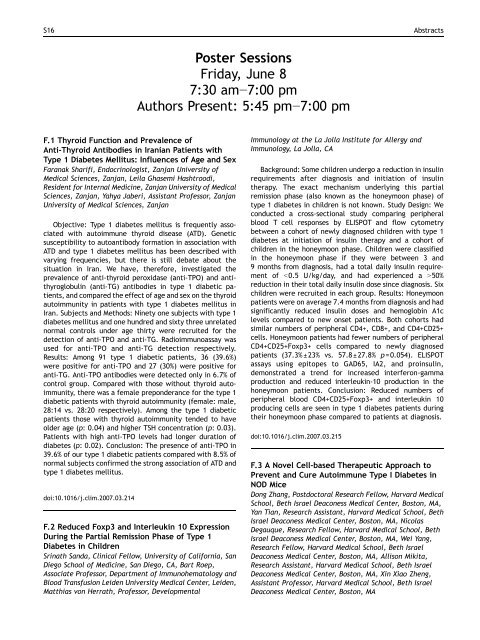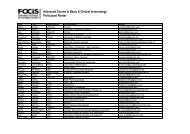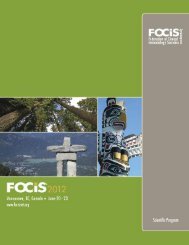Oral Presentations - Federation of Clinical Immunology Societies
Oral Presentations - Federation of Clinical Immunology Societies
Oral Presentations - Federation of Clinical Immunology Societies
You also want an ePaper? Increase the reach of your titles
YUMPU automatically turns print PDFs into web optimized ePapers that Google loves.
S16 Abstracts<br />
F.1 Thyroid Function and Prevalence <strong>of</strong><br />
Anti-Thyroid Antibodies in Iranian Patients with<br />
Type 1 Diabetes Mellitus: Influences <strong>of</strong> Age and Sex<br />
Faranak Sharifi, Endocrinologist, Zanjan University <strong>of</strong><br />
Medical Sciences, Zanjan, Leila Ghasemi Hashtroodi,<br />
Resident for Internal Medicine, Zanjan University <strong>of</strong> Medical<br />
Sciences, Zanjan, Yahya Jaberi, Assistant Pr<strong>of</strong>essor, Zanjan<br />
University <strong>of</strong> Medical Sciences, Zanjan<br />
Objective: Type 1 diabetes mellitus is frequently associated<br />
with autoimmune thyroid disease (ATD). Genetic<br />
susceptibility to autoantibody formation in association with<br />
ATD and type 1 diabetes mellitus has been described with<br />
varying frequencies, but there is still debate about the<br />
situation in Iran. We have, therefore, investigated the<br />
prevalence <strong>of</strong> anti-thyroid peroxidase (anti-TPO) and antithyroglobulin<br />
(anti-TG) antibodies in type 1 diabetic patients,<br />
and compared the effect <strong>of</strong> age and sex on the thyroid<br />
autoimmunity in patients with type 1 diabetes mellitus in<br />
Iran. Subjects and Methods: Ninety one subjects with type 1<br />
diabetes mellitus and one hundred and sixty three unrelated<br />
normal controls under age thirty were recruited for the<br />
detection <strong>of</strong> anti-TPO and anti-TG. Radioimmunoassay was<br />
used for anti-TPO and anti-TG detection respectively.<br />
Results: Among 91 type 1 diabetic patients, 36 (39.6%)<br />
were positive for anti-TPO and 27 (30%) were positive for<br />
anti-TG. Anti-TPO antibodies were detected only in 6.7% <strong>of</strong><br />
control group. Compared with those without thyroid autoimmunity,<br />
there was a female preponderance for the type 1<br />
diabetic patients with thyroid autoimmunity (female: male,<br />
28:14 vs. 28:20 respectively). Among the type 1 diabetic<br />
patients those with thyroid autoimmunity tended to have<br />
older age (p: 0.04) and higher TSH concentration (p: 0.03).<br />
Patients with high anti-TPO levels had longer duration <strong>of</strong><br />
diabetes (p: 0.02). Conclusion: The presence <strong>of</strong> anti-TPO in<br />
39.6% <strong>of</strong> our type 1 diabetic patients compared with 8.5% <strong>of</strong><br />
normal subjects confirmed the strong association <strong>of</strong> ATD and<br />
type 1 diabetes mellitus.<br />
doi:10.1016/j.clim.2007.03.214<br />
Poster Sessions<br />
Friday, June 8<br />
7:30 am−7:00 pm<br />
Authors Present: 5:45 pm−7:00 pm<br />
F.2 Reduced Foxp3 and Interleukin 10 Expression<br />
During the Partial Remission Phase <strong>of</strong> Type 1<br />
Diabetes in Children<br />
Srinath Sanda, <strong>Clinical</strong> Fellow, University <strong>of</strong> California, San<br />
Diego School <strong>of</strong> Medicine, San Diego, CA, Bart Roep,<br />
Associate Pr<strong>of</strong>essor, Department <strong>of</strong> Immunohematology and<br />
Blood Transfusion Leiden University Medical Center, Leiden,<br />
Matthias von Herrath, Pr<strong>of</strong>essor, Developmental<br />
<strong>Immunology</strong> at the La Jolla Institute for Allergy and<br />
<strong>Immunology</strong>, La Jolla, CA<br />
Background: Some children undergo a reduction in insulin<br />
requirements after diagnosis and initiation <strong>of</strong> insulin<br />
therapy. The exact mechanism underlying this partial<br />
remission phase (also known as the honeymoon phase) <strong>of</strong><br />
type 1 diabetes in children is not known. Study Design: We<br />
conducted a cross-sectional study comparing peripheral<br />
blood T cell responses by ELISPOT and flow cytometry<br />
between a cohort <strong>of</strong> newly diagnosed children with type 1<br />
diabetes at initiation <strong>of</strong> insulin therapy and a cohort <strong>of</strong><br />
children in the honeymoon phase. Children were classified<br />
in the honeymoon phase if they were between 3 and<br />
9 months from diagnosis, had a total daily insulin requirement<br />
<strong>of</strong> b0.5 U/kg/day, and had experienced a N50%<br />
reduction in their total daily insulin dose since diagnosis. Six<br />
children were recruited in each group. Results: Honeymoon<br />
patients were on average 7.4 months from diagnosis and had<br />
significantly reduced insulin doses and hemoglobin A1c<br />
levels compared to new onset patients. Both cohorts had<br />
similar numbers <strong>of</strong> peripheral CD4+, CD8+, and CD4+CD25+<br />
cells. Honeymoon patients had fewer numbers <strong>of</strong> peripheral<br />
CD4+CD25+Foxp3+ cells compared to newly diagnosed<br />
patients (37.3% ±23% vs. 57.8±27.8% p=0.054). ELISPOT<br />
assays using epitopes to GAD65, IA2, and proinsulin,<br />
demonstrated a trend for increased interferon-gamma<br />
production and reduced interleukin-10 production in the<br />
honeymoon patients. Conclusion: Reduced numbers <strong>of</strong><br />
peripheral blood CD4+CD25+Foxp3+ and interleukin 10<br />
producing cells are seen in type 1 diabetes patients during<br />
their honeymoon phase compared to patients at diagnosis.<br />
doi:10.1016/j.clim.2007.03.215<br />
F.3 A Novel Cell-based Therapeutic Approach to<br />
Prevent and Cure Autoimmune Type I Diabetes in<br />
NOD Mice<br />
Dong Zhang, Postdoctoral Research Fellow, Harvard Medical<br />
School, Beth Israel Deaconess Medical Center, Boston, MA,<br />
Yan Tian, Research Assistant, Harvard Medical School, Beth<br />
Israel Deaconess Medical Center, Boston, MA, Nicolas<br />
Degauque, Research Fellow, Harvard Medical School, Beth<br />
Israel Deaconess Medical Center, Boston, MA, Wei Yang,<br />
Research Fellow, Harvard Medical School, Beth Israel<br />
Deaconess Medical Center, Boston, MA, Allison Mikita,<br />
Research Assistant, Harvard Medical School, Beth Israel<br />
Deaconess Medical Center, Boston, MA, Xin Xiao Zheng,<br />
Assistant Pr<strong>of</strong>essor, Harvard Medical School, Beth Israel<br />
Deaconess Medical Center, Boston, MA




